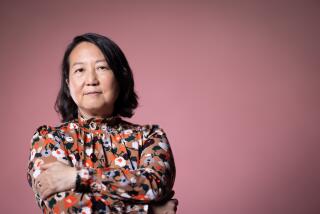In Search of His Family, He Found Solace Instead : Books: The Korean War separated Donald Chung from his family. His heartbreaking return inspired his memoirs, and he has used the proceeds to help build a memorial honoring veterans of the ‘forgotten war.’
LONG BEACH — Korean folk songs played over and over on the stereo the night Long Beach cardiologist Donald Chung turned 50.
“As much as I want to, I cannot return to my home village. . . . In this strange land I am always lonely, always crying. . . . When can I meet my parents, brothers, sisters again?”
The lyrics haunted Chung, who fled North Korea in 1950 and left his mother and sisters behind while he fought for South Korea during the “forgotten war.” That night in 1982, as he wept alone in his study, Chung resolved to track down the family he had not seen for 32 years. And he decided to write his story.
His search for his family proved heartbreaking. When he left, he promised his mother and 11-year-old sister that he would return within three days. When he finally returned, his mother had died and he hardly knew his sisters.
But the memoirs he wrote helped him express his feelings about the war and what had happened to his family. It was published in English and Korean by a small publishing house in Florida. And now he is using the proceeds from the book--titled “The Three Day Promise”--to help honor service veterans who fought in the war.
“The Three Day Promise” has raised almost $500,000, all of which Chung donated to help build the Korean War Memorial in Washington.
Chung and more than 10,000 veterans will join President Bush at a groundbreaking ceremony for the memorial today.
The memorial, which has been redesigned several times, will include 16 soldiers marching in two columns up a hill toward the American flag. A 150-foot wall will be engraved with the faces of hundreds of American soldiers and support personnel who died in the conflict.
It will be built near the Lincoln Memorial, across the Reflective Pool from the Vietnam War Memorial, and is expected to be completed in about three years.
The memorial of faces will complement the memorial of names across the Reflective Pool, said Robert Hansen, executive director of the Korean War Veterans Memorial Advisory Board. In the past six years, corporations and veterans’ organizations have raised $16 million to help construct the memorial. Chung made the largest individual contribution, Hansen said.
Chung said he donated the money to honor the veterans he fought with during the war.
“Without their sacrifice, I could not have found my freedom,” said Chung, who is now a U.S. citizen. “How different would my life be if I lived 33 years under Communist rule?”
The Korean War began in June, 1950, when troops from North Korea invaded South Korea. After the United Nations asked for military support, the United States sent 90% of the troops to South Korea. China and the Soviet Union supported the North. More than 2 million North Koreans fled south to escape Communist rule.
Chung, who was in medical school in Chu-ul in the northeast part of Korea at the time, hid in a foxhole for several days to avoid serving in the North Korean army. During a retreat of South Korean forces in 1950, Chung followed the army south, fearing he would be captured by North Koreans when they retook his town.
Chung and more than 100 other refugees who had followed the army south were forced to join the troops once they crossed the border. Having no way to return home, Chung fought on the front line for the duration of the war and remained in the military afterward for three years.
He then returned to medical school in Seoul and came to the United States in 1962 to serve an internship at a hospital in St. Louis. He advanced quickly and served on the staffs of several American hospitals before opening a private practice in Long Beach in 1971.
Communism’s stranglehold on his country prevented him from trying to locate his family over the years, he said.
But on his 50th birthday, Chung decided that no matter the cost he would track down his mother.
When he returned to his hometown in 1983, he learned that his mother had died four years earlier. Chung reunited with his younger sister and an older sister again in 1986 and continues to write to them every few months. He said, however, that he could never return to his former home to live.
“I have tasted freedom in the United States,” Chung said.
When a syndicated newspaper column promoted his book in 1989, sales skyrocketed. Chung said busloads of Koreans began visiting his office at the Long Beach Memorial Medical Center, both to receive medical care and to compare their experiences.
“They came in crying. Everybody wanted to share something with me,” Chung said. “It’s not a unique story.”
Since 1989, Chung has sold 60,000 copies of his book, and a television station in South Korea documented his story in a 50-episode drama, which was later aired on a local Korean-language station.
Young Park, director of the Korean Federation of Los Angeles, said Chung’s autobiography has touched his community.
“You can see that book in any Korean bookstore in town,” Park said. “Most Koreans understand the feelings of Dr. Chung. . . . His situation resembles any Korean’s who left their loved ones over there.”
More to Read
Sign up for our Book Club newsletter
Get the latest news, events and more from the Los Angeles Times Book Club, and help us get L.A. reading and talking.
You may occasionally receive promotional content from the Los Angeles Times.









